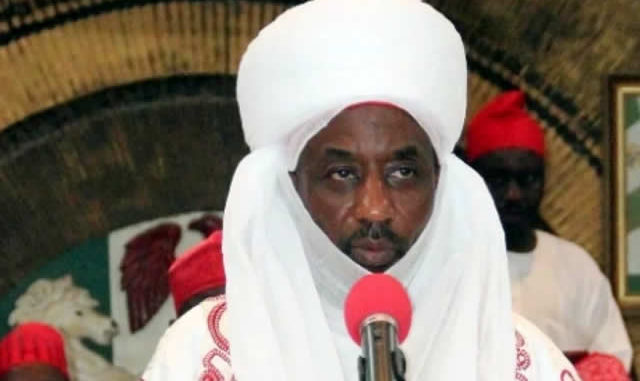
The Emir of Kano, Muhammad Sanusi II, has advised the Federal Government not only to recover looted funds from individuals and groups, but should also prosecute culprits to serve as a deterrent to others.
He gave the advice in a lecture he delivered on the deregulation of the downstream oil sector and Nigeria’s economic development at the National Defence College, Abuja on Wednesday.
He called on the Federal Government to ensure that those who looted the nation’s treasury were punished for their actions.
Sanusi said that it was not enough for those who diverted huge amounts of money from the nation’s treasury to be made to return what they stole.
The emir said that the right thing to do was to recover the stolen funds and imprison the culprits to serve as a deterrent to others.
He said that the ongoing campaign against corruption and the intensified onslaught on insurgency demonstrated the government’s commitment to economic development.
The emir stated that the current economic recession facing the country was self-inflicted.
He said that the fact that the economy was in recession should not be a surprise since it was a product of bad policies.
Sanusi said that the country was made bankrupt by unrealistic policies and failure of those in charge of the government over the years to take corrective measures.
He said, “Nigeria is bankrupt; we are bankrupted by a policy that was foolish, that was unrealistic, and unsustainable, and by all means our refusal over the years to listen.
“We are surprised that we have an economic recession; we are actually surprised that we are in recession? We created the recession.”
The former Governor of the CBN, who commented on the issue of the removal of fuel subsidy, said that it was a scam designed to benefit a few in the country.
He faulted the claims that that subsidy was meant to benefit the poor.
The emir said that the country was losing $20m on every 30,000 metric tonnes of kerosene imported into the country.
Sanusi said, “The whole issue of fuel subsidy was set up to create an opportunity for a few people to make money, and it was presented in a manner that convinced everybody that it was for the poor.
“For every 30,000 metric tonnes of kerosene imported into the country, the Federation Account lost $20m. We were importing six to eight vessels per month for six years until this subsidy unload; the Federation Account was losing from $120m to $160m every month.
“This is just on kerosene; can you imagine a country losing $120m every month to a non-existent subsidy on kerosene, and not on the PMS.”
– PUNCH
